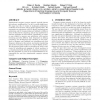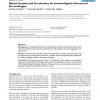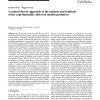954 search results - page 151 / 191 » Principles and Models for Organizing the IT Function |
EXPCS
2007
13 years 11 months ago
2007
Experimental computer systems research typically ignores the end-user, modeling him, if at all, in overly simple ways. We argue that this (1) results in inadequate performance eva...
SDB
1995
13 years 11 months ago
1995
Most of work on partial information in databases asks which operations of standard languages, like relational algebra, can still be performed correctly in the presence of nulls. In...
BMCBI
2007
13 years 7 months ago
2007
Background: An adequate and expressive ontological representation of biological organisms and their parts requires formal reasoning mechanisms for their relations of physical aggr...
BC
2005
13 years 7 months ago
2005
Recent experiments on frogs and rats, have led to the hypothesis that sensory-motor systems are organized into a finite number of linearly combinable modules; each module generates...
ICSEA
2009
IEEE
14 years 2 months ago
2009
IEEE
: This paper presents an approach to model ontologies for the e-Government domain as a basis for an integrated e-Government environment. Over the last couple of years the applicati...



